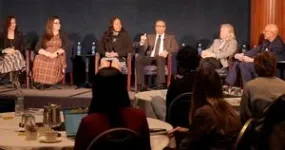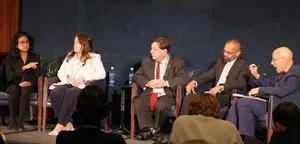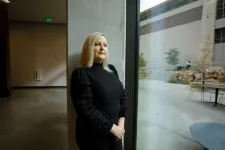The summit featured a series of best practice presentations highlighting some of the tools available to assist in various areas of patient navigation. Those resources have also been published in an online toolkit at NCCN.org/patient-advocacy-resources.
Francesca Gany, MD, MS, Chief of Immigrant Health and Cancer Disparities Services for Memorial Sloan Kettering Cancer Center provided a keynote address on where the patient navigation field is heading in the future. Ronald Kline, MD, Chief Medical Officer, Quality Measurement and Value-Based Incentives Group, Centers for Medicare & Medicaid Services (CMS) took part in a panel dedicated to addressing financial toxicity in oncology.
“The world has seen impressive progress in cancer care over the years, with innovations that are saving more lives than ever before,” said Crystal S. Denlinger, MD, Chief Executive Officer, NCCN, who provided opening remarks. “But those gains can only be realized when everyone has timely, equitable access to the care they need. We must look at the whole patient and empower them to get the help they need to achieve better outcomes. Navigation makes sure people are not slipping through the cracks.”
“The journey through cancer treatment and survival is one that has many stops, starts, turns and off ramps for both patients and loved ones,” explained Rodney Tucker, MD, MMM, Professor of Medicine, Ritchie Endowed Chair in Palliative Care Leadership, Director, University of Alabama Birmingham (UAB) Center for Palliative and Supportive Care, Associate Director for DEI, O'Neal Comprehensive Cancer Center at UAB. “Navigation services—with an emphasis on empowering patients through an interdisciplinary approach and supportive care—is the modern day ‘GPS’ for our patients to arrive at their destinations.”
Many speakers pointed out that cancer care delivery has become more complicated over time, making the role of navigators all the more necessary.
“We are in a transformational era where cancer is increasingly becoming a chronic condition necessitating a more holistic view that focuses on avoidance of low-value, high-cost care before and after the cancer diagnosis,” said Alti Rahman, MHA/MBA, CSSBB, Chief Strategy and Innovation Officer, American Oncology Network.
“As cancer care becomes increasingly complex, care coordination has become even more essential,” agreed Jennifer Bires, MSW, LCSW, OSW-C, Executive Director, Life with Cancer and Patient Experience at Inova Schar Cancer Institute, Leadership Council for AONN+. “This helps ensure that health care systems don’t cause further harm to patients and families but rather contribute to their holistic healing. Insufficient reimbursement often means insufficient access to social work and mental health care during a cancer diagnosis which can impact adherence to treatment and quality of life. Health care systems may sometimes overlook the emotional and mental health needs of patients and families but it’s important to recognize that emotional well-being is an essential part of cancer care.”
The conversation frequently explored inequities in care, and how patient navigation can come into play to reduce disparities in outcomes across race, ethnicity, and other factors.
“Race-based disparities in care for breast cancer and other cancers are endemic in our healthcare system, resulting in greater morbidity and mortality in people of color with cancer, less access to advanced care for this population, and poorer, more-difficult and stressful experiences for these individuals,” said Jamil Rivers, Chief Executive Officer, The Chrysalis Initiative. “Patient navigation can provide the coaching and education needed for informed self-advocacy to overcome bias-based shortcomings, obstacles, and deficiencies in cancer care for patients of color. Peer and professional counseling support can help guide care decisions to assist people of color in coping with the daily challenges of cancer treatment, and to improve their cancer journey.”
"I appreciate this discussion on how we can all come together to eliminate the cancer burdens of our relatives through improved access to prevention, early detection, treatment, and survivorship," said Tina Gerovac-Lavasseur, DNP, RN, Nurse Project Manager, American Indian Cancer Foundation.
Carmen E. Guerra, MD, MSCE, FACP, Ruth C. and Raymond G. Perelman Professor, Vice Chair of Diversity and Inclusion, Department of Medicine, Associate Director of Diversity and Outreach, Abramson Cancer Center, Perelman School of Medicine, University of Pennsylvania, shed light on how Penn Medicine is working to help ease the financial burden of participating in clinical trials and bringing cancer care directly into patients’ homes.
Dr. Guerra noted: “It is important to meet patients when and where they need us to make sure everyone is able to take advantage of the latest advances in cancer care.”
Speakers identified significant financial hardships that can come with cancer care, which can contribute to logistical barriers or issues involving emotional well-being. The final panel discussion focused specifically on policy and practice strategies for reducing the economic burden on patients.
Rifeta Kajdic-Hodzic, Senior Program Manager, Provider Education, Association of Community Cancer Centers (ACCC) said: “The financial burdens that people with cancer experience impact treatment outcomes, access to timely testing, and leave a lasting effect on patients' quality of life and the lives of their families. Navigating a patient through their healthcare coverage and preventing financial ruin from astronomical cancer care costs has grown more complex. More than ever, financial advocacy plays a crucial role in advancing health equity and mitigating financial barriers so that all patients can gain access to high-quality and affordable cancer care.”
Wui-Jin Koh, MD, NCCN’s Chief Medical Officer, provided closing remarks. Conversations were moderated by Clifford Goodman, PhD, Healthcare Consultant, and also included Deric Savior, MD, FCPP, System Division Chief of Hematology-Oncology, Main Line Health; Karen Costello, MSS, LSW, OSW-C, Senior Director & Cancer Support Helpline Navigator, Cancer Support Community; Patrick Delaney, Executive Director, NCCN Foundation; Jackie Herigodt, Director of Partnerships & Engagement, Imerman Angels; and Lisa Schlager, Vice President, Public Policy, FORCE: Facing our Risk of Cancer Empowered.
NCCN’s annual Patient Advocacy Summit follows another recent Oncology Policy Summit where the organization unveiled recommendations for screening health-related social needs (HRSN) in cancer care. At the time, speakers made the case for how and why to measure the unmet economic and social conditions that affect an individual’s ability to maintain health and well-being. This follow-up conversation delved more into how navigators and community groups can help address issues after they are discovered.
Learn more about NCCN’s past events, plus upcoming summits on sexual and reproductive health; advancing diversity, equity, and inclusion in the cancer workforce; and patient education strategies, by visiting NCCN.org/summits.
# # #
About the National Comprehensive Cancer Network
The National Comprehensive Cancer Network® (NCCN®) is a not-for-profit alliance of leading cancer centers devoted to patient care, research, and education. NCCN is dedicated to improving and facilitating quality, effective, equitable, and accessible cancer care so all patients can live better lives. The NCCN Clinical Practice Guidelines in Oncology (NCCN Guidelines®) provide transparent, evidence-based, expert consensus recommendations for cancer treatment, prevention, and supportive services; they are the recognized standard for clinical direction and policy in cancer management and the most thorough and frequently-updated clinical practice guidelines available in any area of medicine. The NCCN Guidelines for Patients® provide expert cancer treatment information to inform and empower patients and caregivers, through support from the NCCN Foundation®. NCCN also advances continuing education, global initiatives, policy, and research collaboration and publication in oncology. Visit NCCN.org for more information.
END









